PHYSALIS
Physalis
L., Sp. Pl. 182. 1753; Gen. Pl. 5: 85. 1754; Clarke in Hook. f., Fl. Brit. India 4: 238. 1885; Bailey, Stand. Cyclop. Hort. 5: 2608. 1917; Cooke, Fl. Pres. Bomb. Reprint ed. 2: 339. 1967; Matthews & Rani in Matthews, Fl. Tamilnadu Carn. 1: 1056. 1983; Fl. China @ eFloras.org 17: 311-312. 1994; Nasir, Fl. Pak. @ eFloras.org p. 24.
Annual or perennial herbs, glabrous or pubescent with simple hairs. Leaves alternate, simple, entire, denticulate or sinuate, soft textured. Flowers solitary in leaf axils or branch forks, actinomorphic, bisexual, 5-merous, hypogynous. Calyx 5-cleft, campanulate, persistent. Corolla yellow or white, often with a contrasting eye, rotate or rotate-campanulate, subentire or 5-lobed. Stamens 5, shorter than corolla, attached near the base of corolla tube; filaments sometimes expanded at base; anthers dehiscing longitudinally. Carpels 2, syncarpous; ovary 2-locular, ovules numerous per loculus, placentas swollen, placentation axile; style slender; stigma minutely 2-lobed. Fruiting calyx becoming enlarged, inflated, entirely enveloping fruit, membranous or leathery, with 5 or 10 longitudinal ribs, base often invaginated. Fruit a juicy globose berry. Seeds numerous, compressed, discoid or reniform, minutely pitted.
95 species
Physalis angulata
Physalis angulata
L., Sp. Pl. 1: 183. 1753; Digital Fl. of Taiwan @ eFloras.org; keralaplants.in; P. micrantha Link, Enum. Hort. Berol. Alt. 1: 181.1821; Babu, Herb. Fl. Dehra Dun 338. 1971; Dhaliwal & Sharma, Fl. Kullu Dist. 469. 1999; P. minima L., Sp. Pl. 183. 1753; Hook. f., Fl. Brit. Ind. 4: 238. 1885; Collett, Fl. Siml. ed. 2: 843. 1921 (Reprint 1980), Sharma & Kachroo, Fl. Jammu (Illustr.) 2: t. 192. 1983; Singh & Sharma, Fl. Chamba Dist. 493. 2006; Fl. China @eFloras.org 17: 312; P. parviflora R. Br., Prodr. Fl. Nov. Holland. 447. 1810; P. angulata var. villosa Bonati, Fl. Indo-Chine 4(3): 335. 1915.
Annual, erect or diffuse, 20-60 cm high pubescent herb. Stems simple or much branched, angular, ribbed, fistular, green; stem ribs scaberulous. Leaves usually alternate; petioles 2-7 cm long; leaf blade 3-12.5 cm x 1.5-7.5 cm, ovate or elliptic-ovate to elliptic, leaf base obliquely cuneate, broadly cuneate, rounded or asymmetric, apex acute or acuminate, margin entire, sinuate or remotely dentate, glabrescent. Flowers solitary axillary or in branch forks, ca. 1 cm x 1 cm, actinomorphic, bisexual, 5-merous, hypogynous, pale creamy yellow, on 10-13 mm long pedicels in anthesis; flower at right angles (90+) to pedicel. Calyx 5-6 mm long, campanulate, pubescent outside, 20-ribbed, ribs purple; tube cupulate, ciliate; lobes 5, 2.5-3 mm long, about as long as calyx tube, triangular-lanceolate, acuminate. Corolla ca. 1 cm x 1 cm, rotate or rotate-campanulate, 5-angled; lobes 5, broadly and shallowly triangular, subacute, finely pubescent on outside, throat yellow with purple spots. Stamens 5, attached near the base of corolla tube; filaments equal or unequal, 1.5-5 mm long; anthers ca. 2 mm long, ovate-oblong, light blue or whitish, basifixed, dehiscence longitudinal. Carpels 2, syncarpous; ovary ca. 2 mm long, glabrous, 2-locular, ovules numerous per loculus on swollen placentas, placentation axile; style slender, 4-5 mm long; stigma capitate, obscurely 2-lobed. Fruiting calyx 10-angled with 5 major and 5 minor ribs, ribs purple, pale green (pale brown when dry), inflated, ovoid, suddenly narrowed towards apex, pubescent, up to 3 cm long and 2 cm in diameter. Berry 8-14 mm across, globose, stipe ca. 1 mm long, juicy, imprisoned in inflated calyx, pendulous, with fruiting pedicel ca. 3 cm long. Seeds 1.5-2 mm across, subglobose or reniform, compressed, rugose, light brown.
Common Names: : Cutleaf Ground Cherry, Dog Tomato, Cold Cherry, Sunberry, Country Gooseberry
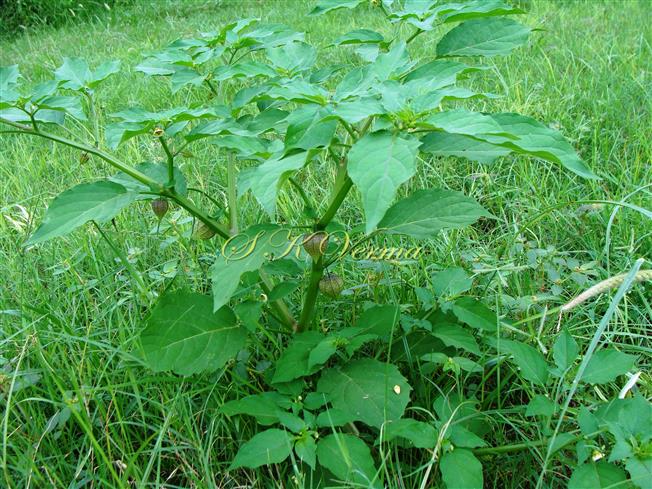
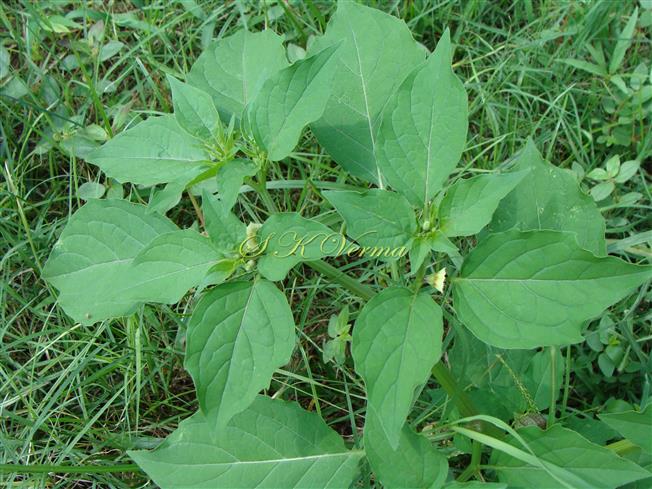
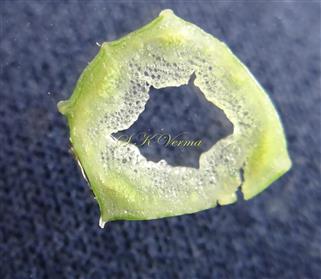
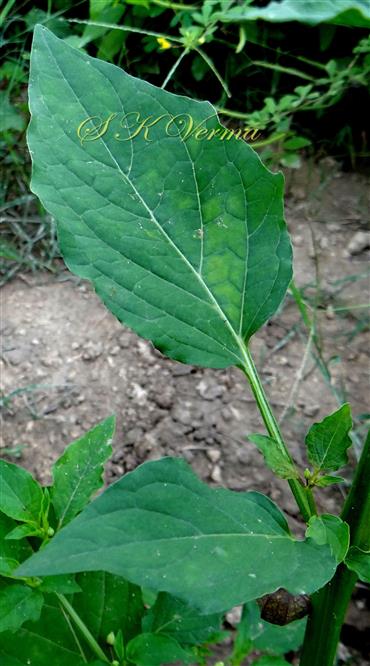
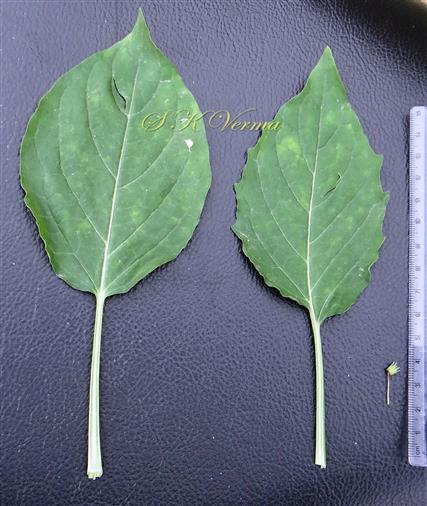
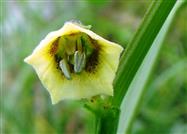
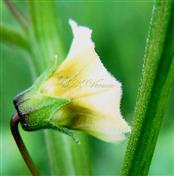
-DSC03334.jpg)
-08613.jpg)
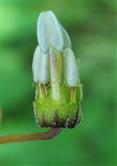
-DSC03440.jpg)


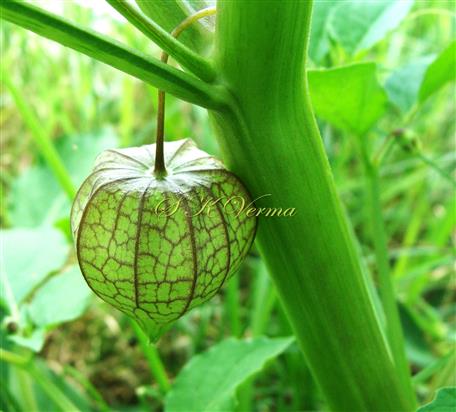
 exposed from calyx-8681.jpg)
-DSC03341.jpg)









-DSC03334.jpg)
-08613.jpg)

-DSC03440.jpg)
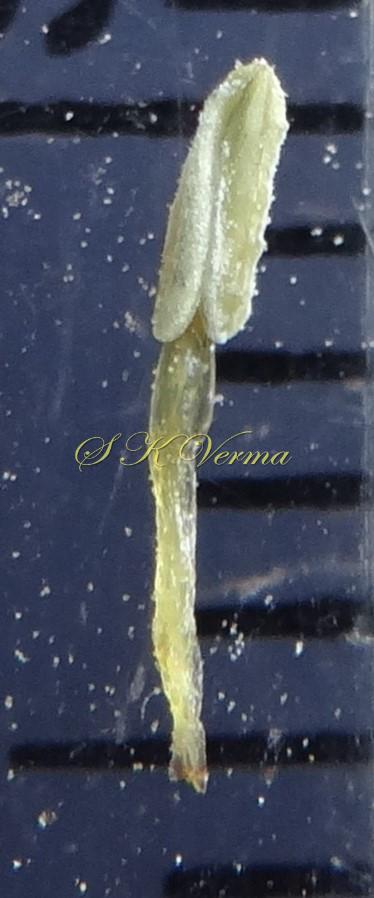


 exposed from calyx-8681.jpg)
-DSC03341.jpg)
